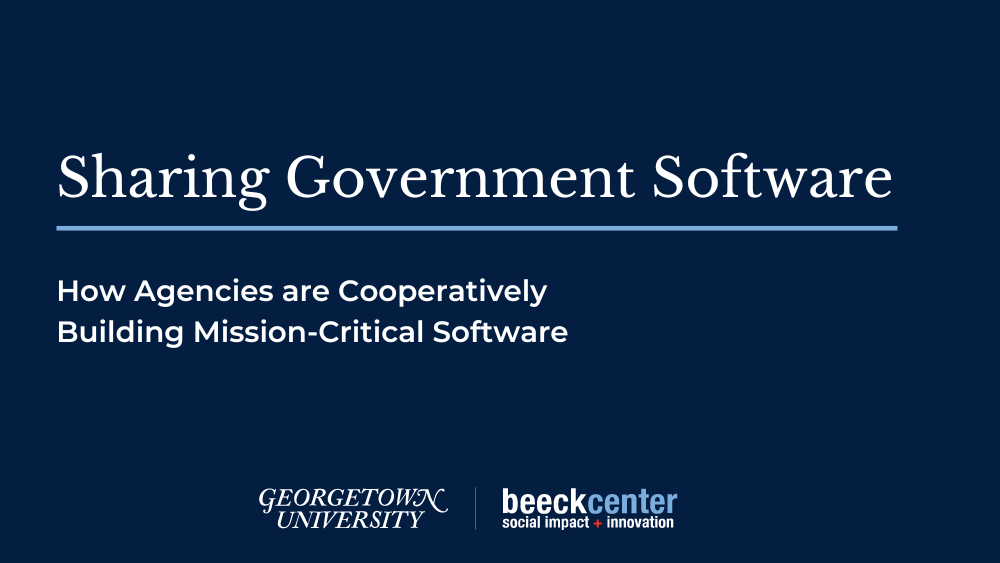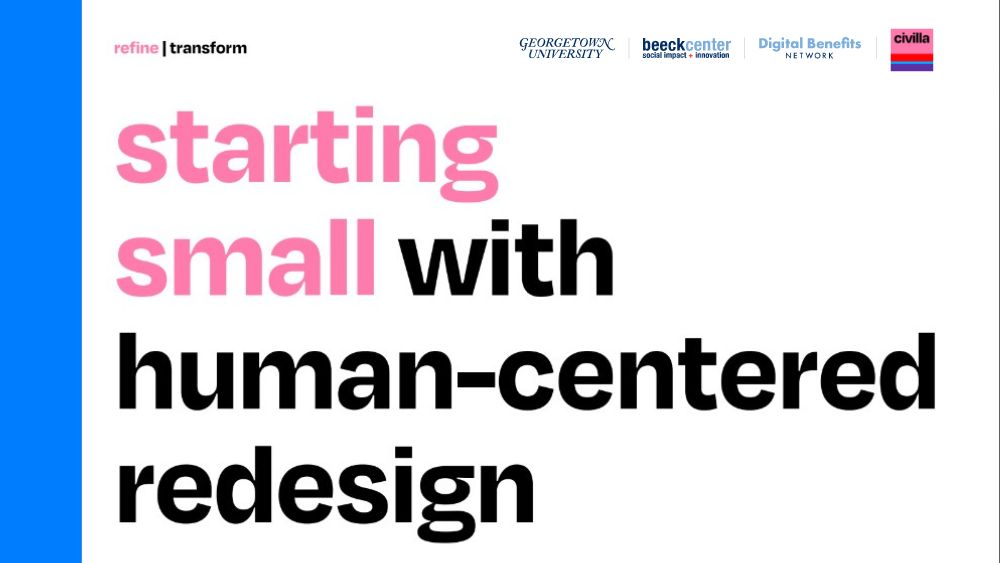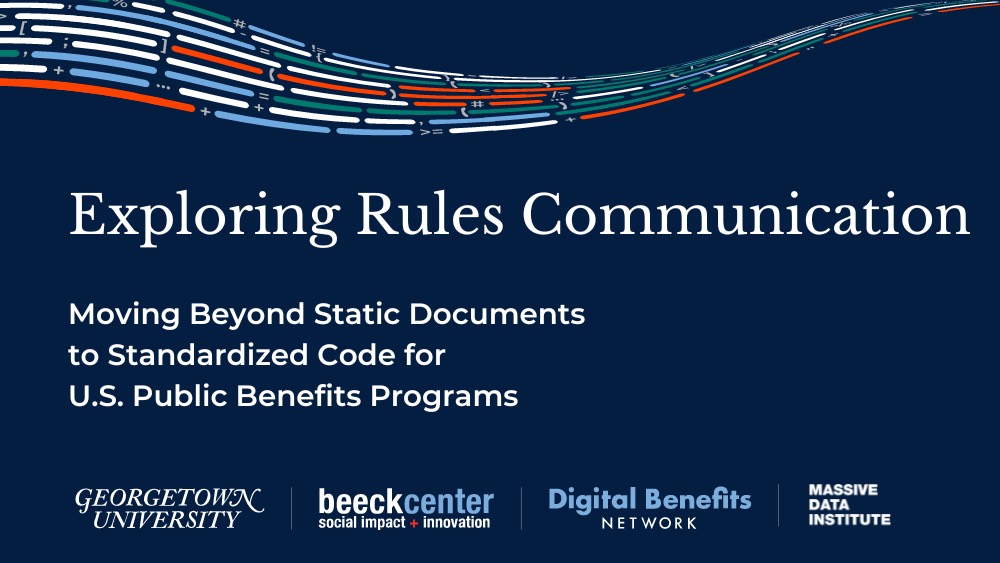Beeck Center for Social Impact + Innovation at Georgetown University
The Beeck Center improves systems that are the foundation for daily life, using data, design, technology, and policy as instruments for equitable societal change.
As part of the Beeck Center, the Digital Benefits Network generates insights and fosters collaboration, so public sector practitioners have what they need to improve digital access to economic and wellbeing supports.

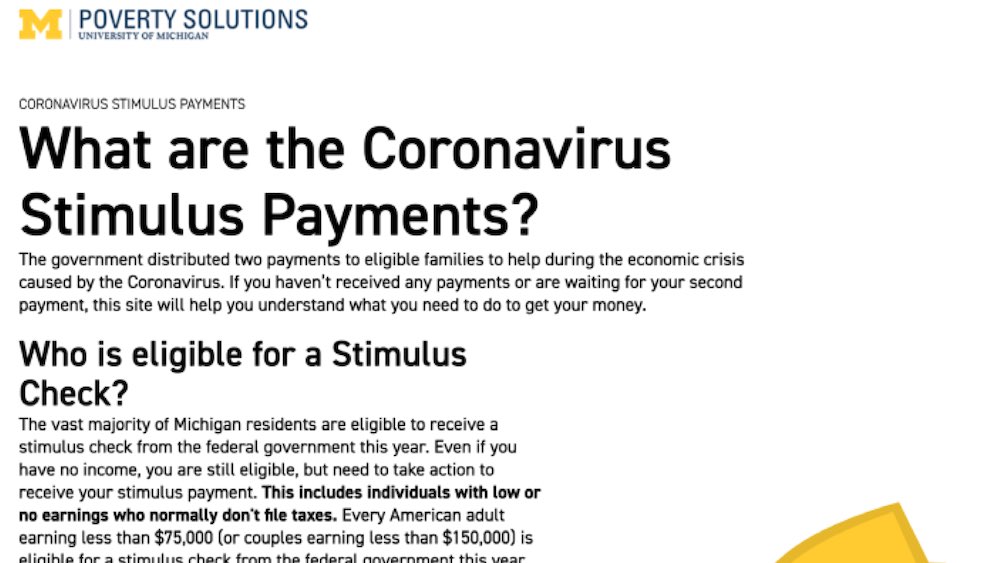
Accessible Content for Economic Recovery
The federal government authorized stimulus payments and the expanded Child Tax Credit to support American taxpayers through the COVID-19 pandemic. However, this could have denied benefits to the millions of low-income Americans who were not required to file taxes and who needed help the most.

ACS Pathways to Prevention
New York City's Administration for Child Services (ACS) coordinates prevention services with over 135 different programs and over 45 providers to help approximately 44,000 children annually live safely with their families. The existing process for connecting families with the agency does not account for their needs and opinions.
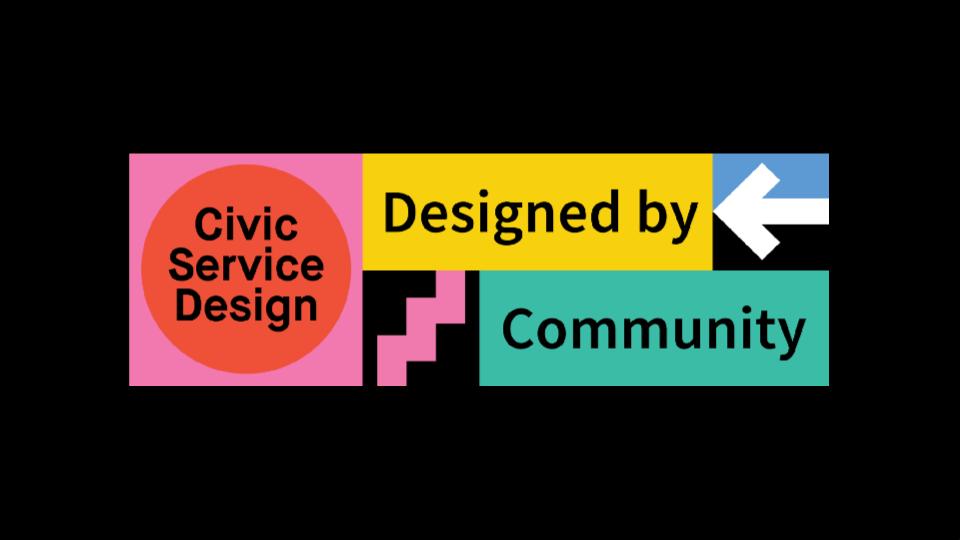
Designed by Community Program
The COVID-19 pandemic disproportionately harmed marginalized communities and heightened existing inequities. The NYC Mayor’s Office for Economic Opportunity (NYC Opportunity) wanted to work with non-profit organizations to empower community leaders to design more targeted and effective solutions for challenges in their communities.

HOME-STAT
Despite New York's extensive service delivery infrastructure, people experiencing street homelessness in the city face many different and complex pathways towards finding stable housing. New York recognized a need to track these experiences to provide more direct, coordinated, and effective service delivery in the context of this broader journey.

Louisiana: Expanding a Successful Texting Pilot During the COVID-19 Pandemic
The COVID-19 pandemic placed incredible pressure on public assistance programs at a time when states like Louisiana were already trying to conduct more effective outreach to benefits applicants and recipients. These efforts were complicated by a surge in applications and the need to close government offices.

MIBridges: Making Online Benefit Websites Work More Effectively
Millions of Michigan residents receive public assistance through the Michigan Department of Health and Human Services (MDHHS). Half of them tried to apply for and access these benefits online. However, the existing application was not mobile-friendly and it required more than 45 minutes to complete. This created delays and frustrating experiences for residents and agency staff.

Minnesota: Rolling Out an Integrated Benefits Application in Stages
Minnesota posed a number of unique challenges towards efficient service delivery of public benefits. In addition to a fragmented application process, each of Minnesota's 87 counties maintained their own systems for managing assistance programs. Further issues stemmed from Minnesota's high levels of racial disparities, 11 tribal nations, and disproportionately large refugee population.

Missouri: Understanding Current Problems and Opportunities to Inform Priority Setting in Public Assistance
The Missouri Department of Social Services (DSS) delivers public assistance to more than one million Missouri residents annually. Each benefit program has a different application, resulting in a combined 63 pages of application forms and case backlogs. Beneficiaries and caseworkers are overwhelmed by the complicated and confusing nature of this process.

New York City Benefits and Programs: Designing, Translating and Scaling Accessible Content
New York City's platform for accessing and learning about benefit programs, ACCESS NYC, increasingly struggled to adapt to new use cases, technological innovation, and more efficient methods of website maintenance and content sharing. These challenges impeded NYC’s ability to deliver up-to-date accessible benefits information and eligibility screening to residents when they needed it.

Power to the People: Human-Centered Design Within Social Service Coordination
Residents in poverty-affected communities like East Austin often face extensive barriers towards accessing healthcare and social services and lack fora for community engagement. The COVID-19 pandemic increased and contributed to many of these challenges.

Project Re:form — Redesigning Michigan's Assistance Application
Michigan had the longest public benefits application in the country. The application was fragmented across five different benefits programs and contained 64 pages, 1,000 overlapping questions, and convoluted language. These complications burdened Michigan residents and forced agency officials to waste valuable time correcting errors.

Project Re:new — Redesigning Michigan's Benefits Renewal Forms
Michigan residents must renew their benefits annually to continue receiving public assistance. Unfortunately, each assistance program had its own renewal form, and the process was plagued by complicated language and undelivered forms. As a result, many residents lost their benefits and the state spent about $25 million annually correcting errors.

Redesigning Michigan's Benefits Correspondence
The correspondence sent by Michigan to its residents containing benefits programs updates and action items continues to be too long, too vague, and too reliant on legal jargon. This prevents residents from getting the help they need and forces agency staff to spend time explaining the letters.

Trauma-Informed Homelessness Service Interactions and Strategy
When accessing the Office of Homelessness (OHS) prevention, diversion, and intake service, Philadelphians must go through many opaque steps and processes—often while in crisis or experiencing a traumatic event. Navigating confusing processes and paperwork can exacerbate feelings of distress or trauma. When delivering the service, staff also follow specific processes, offer information, and coordinate support while taking in difficult stories and daily stressors. These lived realities require adopting a trauma-informed approach to service delivery.

Vermont: Piloting A Document Uploader For Benefit Eligibility
To verify their eligibility for public assistance, low-income Vermont residents were forced to either physically visit one of only 12 Economic Services Division Offices or use the mail to submit documents. This delayed the application process and hindered residents' ability to access benefits.

The “Income Passport”: Income Verification for Gig Workers in Louisiana and Alabama
In response to the COVID-19 pandemic, the federal government made gig workers countrywide eligible for unemployment benefits for the first time through the Pandemic Unemployment Assistance (PUA) and Mixed Earners Unemployment Compensation (MEUC) programs. These benefits helped expand the social safety net during a time of crisis, but states were not equipped to quickly process the volume of applications they received. Overall, this strained state capacity and, especially early in the pandemic, increased avenues for fraud. Many eligible gig workers also struggled to provide the necessary income information, and income verification issues resulted in delayed or denied benefits for gig workers. State workforce agencies needed to find ways to efficiently make sense of and verify income from gig work, which can be generated from multiple sources at multiple times, sometimes even within the same day.

18F's Eligibility APIs Initiative
18F is an internal technology and design consultancy as part of the Technology Transformation Service (TTS) in the General Services Administration (GSA) in the U.S. Federal Government. Their teams work with federal agencies to build and buy technology, and can also work with states and local agencies on initiatives receiving federal funding. They seek to build digital services that are trustworthy, designed with the people who use them, deliver good value, and are shipped efficiently and when possible, in the open.

ACCESS NYC & Benefits Screening API
New York City Mayor’s Office for Economic Opportunity (NYC Opportunity) uses evidence and innovation to reduce poverty and increase equity. The multidisciplinary team funds and scales new approaches, uses methodologies such as service design, digital product development and data integration to improve access to social services, and provides research, including the poverty measure for the city.

Alluma: One-x-Connection
Alluma is a nonprofit organization dedicated to connecting people to help. They are reimagining the way technology is used to enable people to have agency to connect to opportunity. For over 20 years, Alluma has been providing digital solutions and consulting services that assist individuals, non-profit organizations, and various state and county agencies with eligibility determination and enrollment into various social benefit programs. They also connect people to local community resources. Through their human-centered, modular solutions, they support cross-benefit eligibility screening and enrollment in 45 counties and two states. Alluma has screened over 10 million individuals for eligibility and submitted more than 67 million program applications. In 2020, Alluma merged with One Degree to expand their ability to connect people to community-based services in addition to public benefits.

Benefits Launch
Benefits Data Trust (BDT) is a nonprofit that works nationally to connect people with public benefits. They use a unique approach that blends direct assistance, policy and practice solutions, data, and technology to provide efficient and dignified access to assistance. Since 2005, they have assisted in more than 800,000 benefits enrollments (including over 90,000 in 2021 alone) and secured over $9 billion in benefits for eligible households. BDT currently provides enrollment assistance in seven states.

Comprehensive Careers and Supports for Households (CCASH)™
MITRE is a not-for-profit organization that works in the public interest across federal, state, and local governments, as well as academia and industry. MITRE operates federally funded research and development centers (FFRDCs) and conducts independent research. Their work aims to tackle challenges to the safety, stability, and well-being of the U.S.

Mes Aides
beta.gouv.fr is a French government incubation program. The incubator was established to help public agencies build digital services that are simple, easy to use, and meet user’s needs.

mRelief
mRelief is a nonprofit software product company which helps people in all 53 states and territories participating in SNAP find out if they are eligible and apply for SNAP. Their mission is to “transform social services for the inherent dignity of all people.” They have helped over 2.7 million individuals, and have unlocked over $1 billion in SNAP benefits.

Policy Rules Database
The Policy Rules Database is a collaborative effort between the Advancing Careers for Low-Income Families Initiative at the Federal Reserve Bank of Atlanta and the National Center for Children in Poverty (NCCP). NCCP is a non-partisan research center that conducts research and translates evidence into actionable recommendations that advocates and policymakers can use to improve the lives and futures of low-income children and their families. The Advancing Careers for Low-Income Families Initiative’s mission is to carry out research on benefits cliffs and develop tools to support community and state efforts to improve economic security for families. The program also undertakes projects to help meet business talent needs to promote a healthy economy.

PolicyEngine
PolicyEngine is a non-profit that seeks to compute the impact of public policy for the world. Through their free, open-source application, they want to make policy information accessible, and help users understand policy effects at the individual and population level. By giving policymakers and residents greater access to policy rules and their effects, PolicyEngine hopes to promote more democratic policymaking processes.





























